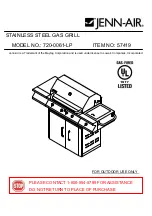
21
(debris, insects) in either the burner portholes or
the primary air inlet of the burners. Use a pipe
cleaner to clear obstructions.
When refitting the burners, be careful to check
that the neck of the burner fits over the valve
outlet.
It is quite normal for surface rust to be present
on the burners. If rust appears between uses or
in storage, clean with a soft brass wire brush.
Flame Tamer
Remove any food residue from the flame tamer
surface with a plastic or wooden scraper or
brass wire brush. Do not use a steel scraper or
wire brush. Clean with hot soapy water and
rinse well.
Drip Tray
After every use, empty and clean the drip tray
(and foil liner, if applicable) of any fat or food
particles, using a plastic or wooden scraper if
necessary.
Failure to keep it clean, and excessive build up
can result in a fat fire. This can be hazardous
and severely damage the barbecue.
This is not
a fault in the barbecue and is therefore not
covered by the terms of the warranty.
If
required, the tray can be washed in hot soapy
water.
Barbecue Body
Regularly remove excess grease or fat from the
barbecue body using a cloth wrung out in hot
soapy water and dry thoroughly. Excess fat and
food debris can be removed from inside the
body using a soft plastic or wooden scraper. It
is not necessary to remove all the grease from
the body. If you need to clean fully, use hot
soapy water and a cloth, or nylon-bristled brush
only. Do not use abrasives. Remove cooking
surfaces and burners before full cleaning. Do
not immerse the gas controls or manifold in
water. Check burner operation after carefully
refitting into body.
A stainless steel cleaner may be used on
stainless steel parts if required.
Barbecue Hood or Lid & Trolley
Use a non-abrasive cloth or pad and clean with
hot, soapy water. Do not use scouring pads or
powders as they can permanently damage the
finish.
Stainless Steel
Stainless Steel is a type of steel containing
chromium, which offers high resistance to
corrosion and heat by forming a protective layer of
Chromium Oxide. Exposure to fat, dirt and water
can prevent the protective layer being formed,
which can lead to spotting such as surface
discolouration and rust.
Stainless steel surfaces can be cleaned using a
stainless steel cleaner or methylated spirits and
any spotting should be taken care of immediately.
Failure to remove spotting can lead to permanent
discolouration.
n
Never use a chlorine based cleaner on
stainless steel.
n
Do not use a wire brush, steel wool or
abrasives as these will strip the protective
layer, which can lead to rusting.
n
Always rinse and allow to dry after cleaning.
Fixings
All screws and bolts, etc. should be checked
and tightened on a regular basis.
Storage
Ensure the barbecue is properly cooled before
covering or storing. Store your barbecue in a
cool dry place.
Cover the burners with aluminium foil in order to
prevent insects or other debris from collecting in
burner holes.
If the barbecue is to be stored indoors, the gas
bottle must be disconnected and left outside.
The gas bottle should always be stored outside,
in a dry, well-ventilated area, away from any
sources of heat or ignition. Do not let children
tamper with the bottle.
When using the barbecue after extended
periods of storage follow the cleaning
procedures.




































